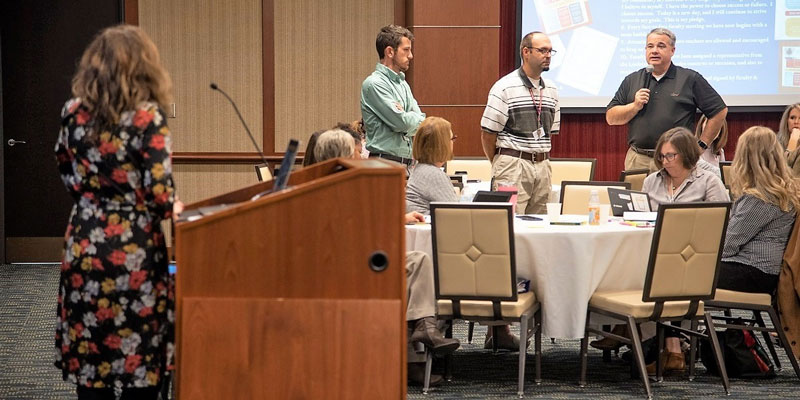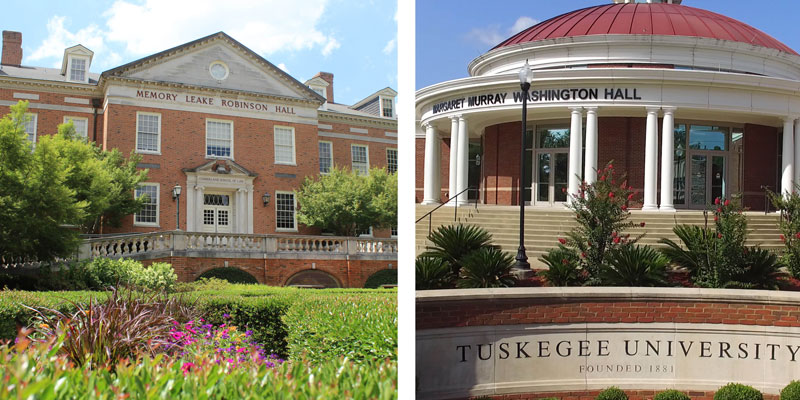Seeds of hope planted in some Alabama schools are sprouting into tiny yet vigorous sprigs that signal a bumper crop. The shoots will grow over the next few years as those schools work to reap the harvest of a Hope Institute program that cultivates character in students.
Housed at Samford University, the nonprofit is the brainchild of Drayton Nabers, a former Alabama Supreme Court chief justice, and Liz Huntley, a lawyer and child advocate whose memoir, “More than a Bird,” recounts overcoming a harrowing childhood to become a successful attorney and a member of Auburn University’s board of trustees. The two bonded over “education with values,” as Huntley put it, as board members of Cornerstone Schools of Alabama.
In November 2016, Nabers and Huntley birthed what became the Hope Institute in Samford’s Frances Marlin Mann Center for Ethics and Leadership, which Nabers directs. Eight K-12 public and private schools took part in a pilot program for professional development in character education.
Buoyed by the pilot’s promise, they created the Hope Institute and then the Hope Academy. This past year, the academy recruited education leaders from 20 K-12 schools in north and central Alabama to study character development through education. Six daylong workshops for about 100 teachers, administrators and counselors featured national leaders in character education, designing a character development plan for schools, visiting schools with existing character education programs and networking with other school leaders.
“It is really exciting to go into those schools and see how they are developing a culture in the schools such that good character can be generated and formed in the students,” Nabers said. “Once you do that, everything else will fall into place. Grades will go up, problems with discipline will go down, and the spirit and joy and energy of the school will be elevated.”
Early signs of progress are unmistakable to the school leaders who gathered at Samford earlier this month to kick off the second year of the program.
At University Charter School in Sumter County, counselor Meghan Dunn spoke of place-based projects that have brought together black and white students for the first time. Students take walking field trips, and last month visited a graveyard.
“They found a headstone of a baby that had passed away. You see several students, obviously all different colors, which is a big deal for our community, holding hands and praying over that headstone,” Dunn said. “That was really huge to us.”
Students also noticed a fence in the graveyard that separates the gravestones of white people and of black people, Dunn said. Their new place-based project is to get the fence removed.
Ben White, assistant principal at Walker Elementary School, recently heard a student say the word “initiative,” which is used in character education lessons.
“I heard a student the other day say, ‘Hey, don’t throw that away. I’m going to clean up this area. I’m going to take some initiative,’” White said. “And I was like, ‘Wow, that’s a word we would not have used before this point,’ but they want to do things.”
Debra Harvel, assistant principal at Hartselle Intermediate School, loves seeing the terminology of character education infiltrating student conversations but also watching students model that terminology. The sixth-graders, in particular, have taken to service learning projects.
“They’ve come to us with more ideas,” she said, citing projects such as being pen pals and raising money for an orphanage. “They just keep coming with ‘let’s do this, let’s do that.’ It’s exciting to see that.”
A thirst for character education
Longtime educator Jodi Newton, superintendent of Homewood City Schools for more than a decade and now the Hope Institute’s executive director, leads Hope Academy’s introductory first-year course, which this year includes 25 new schools. Newton is thrilled to see school officials thirst for character education.
“We do know that schools in this country were developed for literacy, and for virtue. That’s what they did,” said Newton, former associate dean of Samford’s School of Education. “Our Founding Fathers told us you cannot have a democracy without literate people of character. They had it right.”
Kara Chism, the Hope Institute’s director of programs and curriculum, is leading the first 20 schools in their second year of the program, which includes book study, workshops on Samford’s campus, site visits to other schools, focus groups and on-site consulting at the participating schools. While schools spent the first year building a culture of character by adopting core values, putting them on posters and T-shirts and holding character education classes, the next step is to infuse the curriculum with character content, she said.
“Right now, a lot of them are having a time where they teach character, but we want to see that integrated into their classrooms, in all their subjects and instruction,” Chism said.
The case for character
Why does character matter? Huntley offered the case for character driven by today’s divided society.
“We can’t think of a time it is more needed in our society than today, regardless of what aisle you sit on,” she says. “It’s a very polarizing, negative environment and our kids are watching grown folks – adults who are supposed to be their examples – how they’re behaving.”
Newton says schools will have better attendance, fewer disciplinary problems and improved academics. Character education can play a huge role in a successful workforce development program for the state, she said.
“If we have people graduating from our K-12 schools who are people of character and they have learned performance character, things like resilience, and responsibility, and work ethic, then they are going to be better workers,” Newton said.
Ultimately, the Hope Institute is built on the idea that developing people of good character can cure, or at least lessen, a litany of ills in society. As the institute’s website puts it:
“Without good character in its citizens, our country will not succeed with its democratic institutions or free market economy. Nor without such character can our families flourish, nor can anyone obtain happiness. Virtually everyone acknowledges that the nation’s most pressing social problems such as crime, school dropouts, poor work ethic, incivility and broken families have at their core the absence of good character.”
To learn more about the Hope Institute, visit here.
(Courtesy of Alabama NewsCenter)













